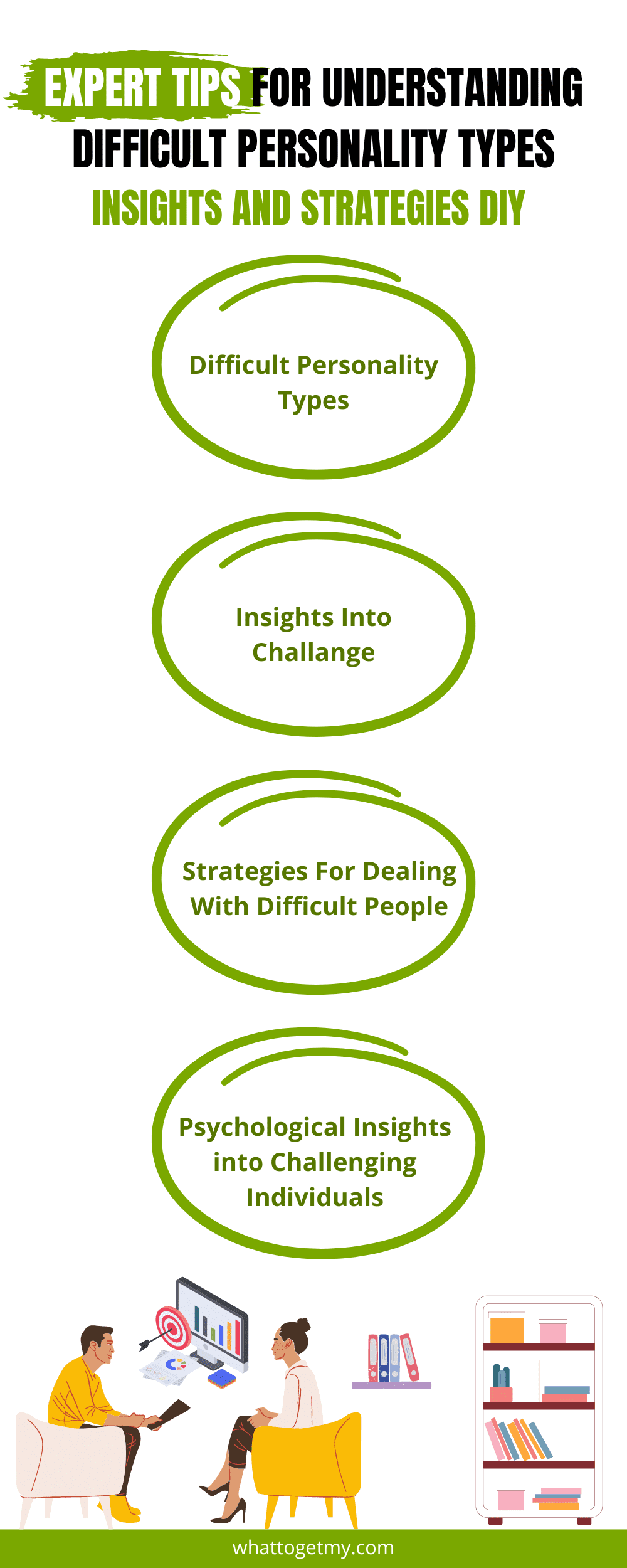Expert Tips for Understanding Difficult Personality Types: Insights and Strategies DIY
Table of Contents
Understanding difficult personality types can be challenging, requiring patience and effective strategies.
Narcissistic individuals exhibit an inflated sense of self-importance and a constant need for admiration.
To effectively navigate difficult personalities, it is crucial to delve deeper into the insights and characteristics that define them.
Equipped with insights into different personality types, it’s time to explore practical strategies for effectively managing difficult individuals.
We can approach interactions with greater compassion and patience by acknowledging and empathizing with their fears.
Understanding difficult personality types can be challenging, requiring patience and effective strategies. In this article, we will delve into the intricacies of difficult individuals and provide valuable insights and strategies to navigate these complex dynamics. We can foster healthier relationships and more harmonious interactions by understanding different personality types and equipping ourselves with practical tools. Read on to discover key insights and practical strategies for understanding and dealing with difficult personalities.
Section 1: Difficult Personality Types
When understanding complex individuals, it is essential to recognize the various types of challenging personalities. By familiarizing ourselves with these personality types, we can gain valuable insights into their behaviors, motivations, and patterns. Difficult personality types encompass a range of characteristics and tendencies that can make interactions challenging and sometimes exhausting. Each type presents unique challenges, from narcissistic individuals to passive-aggressive behavior patterns.
Dealing with Difficult Personality Types: Insights and Strategies
Navigating interactions with difficult personality types can be a complex and demanding task. Understanding the different types of challenging personalities is critical to developing effective strategies for managing these individuals. In this article, we will explore the various complex personality types, gain insights into their behaviors and motivations, and provide practical strategies for dealing with them. By delving into the intricacies of these personalities, we can equip ourselves with the knowledge and tools necessary to foster healthier and more harmonious relationships.
1. Narcissistic Individuals
Narcissistic individuals exhibit an inflated sense of self-importance and a constant need for admiration. They often lack empathy and may manipulate others to meet their own needs. Strategies for dealing with narcissistic individuals involve setting boundaries, maintaining a solid sense of self, and not engaging in manipulative tactics.
2. Passive-Aggressive Behavior
Passive-aggressive behavior is characterized by indirect resistance, procrastination, and expressing hostility in subtle ways. When confronted with passive-aggressive individuals, it is vital to address the underlying issues, encourage open communication, and assertively express concerns without escalating conflicts.
3. Manipulative Personalities
Manipulative individuals use deceit and manipulation to control others and achieve their desired outcomes. Dealing with manipulative personalities requires a firm stance, clear communication, and personal integrity. Recognizing their tactics and setting firm boundaries are crucial for navigating interactions with manipulative individuals.
4. Aggressive Types
Aggressive individuals display a hostile and confrontational demeanor. They may resort to intimidation and verbal or physical aggression to assert dominance. Practical strategies for dealing with aggressive types include remaining calm, asserting boundaries assertively, and, if necessary, removing oneself from potentially dangerous situations.
The data presented in a 2015 survey among American Millennials reveals the self-perceived personality traits of this generation. According to the survey by Statista, a majority of 59 percent of the respondents from the Millennial cohort acknowledged their own generation’s self-centered tendencies. Additional findings indicate that 49 percent of Millennials consider themselves wasteful, while 43 percent characterize their generation as driven by greed.
5. Passive Personalities
Passive individuals avoid conflict and may struggle to express their needs and assert boundaries. When interacting with passive individuals, it is important to encourage open communication, validate their feelings, and empower them to assert themselves in a supportive environment.
6. Perfectionistic Behavior
Perfectionistic individuals have high standards for themselves and others, often leading to rigidity, criticism, and difficulty accepting imperfections. Dealing with perfectionistic personalities involves fostering a supportive environment, encouraging self-compassion, and promoting a growth mindset that embraces learning from mistakes.
7. Highly Sensitive Individuals
Highly sensitive individuals are deeply affected by emotions and external stimuli. They may become overwhelmed quickly and require extra care and understanding. Strategies for interacting with highly sensitive individuals include providing a safe space, active listening, and respecting their need for solitude when necessary.
8. Passive-Dependent Types
Passive-dependent individuals rely heavily on others for decision-making and emotional support. They may struggle with assertiveness and self-reliance. When dealing with passive-dependent types, it is crucial to encourage autonomy, provide guidance, and empower them to make their own choices.
9. Critical and Judgmental Personalities
Critical and judgmental individuals tend to focus on others’ flaws and shortcomings. They may be quick to criticize and rarely offer praise or encouragement. Coping with critical personalities involves setting boundaries, fostering open dialogue, and redirecting their attention to more constructive aspects.
10. Avoidant Personalities
Avoidant individuals fear rejection and may avoid social interactions or emotional intimacy. Building trust, creating a safe and supportive environment, and encouraging gradual exposure to challenging situations can help individuals with avoidant tendencies develop healthier relationship patterns.
Understanding difficult individuals and effectively dealing with their type is a valuable skill set that can enhance our relationships and personal well-being. Recognizing the various challenging personalities and employing appropriate strategies, we can navigate interactions with greater empathy, assertiveness, and resilience. Remember, it is essential to prioritize self-care, maintain healthy boundaries, and seek support when needed.

Section 2: Insights into Challenging Personalities
To effectively navigate difficult personalities, it is crucial to delve deeper into the insights and characteristics that define them. By understanding why specific individuals exhibit challenging behaviors, we can approach interactions with empathy and a broader perspective. Understanding difficult individuals involves exploring their underlying fears, insecurities, and defense mechanisms that drive their behavior. This insight can help us separate the person from their actions and foster a more compassionate approach.
Insights into Challenging Personalities: Understanding the Drivers of Difficult Behaviors
Navigating interactions with challenging personalities requires a deeper understanding of the insights and characteristics that underlie their behavior. By gaining insights into the reasons behind their challenging behaviors, we can approach these individuals with empathy and a broader perspective. Understanding complex individuals involves delving into their underlying fears, insecurities, and defense mechanisms that drive their actions.
One key aspect of understanding challenging personalities is recognizing that their behavior is often rooted in deep-seated fears and insecurities. These individuals may exhibit defensive behaviors to protect themselves from perceived threats or vulnerabilities. We can approach interactions with greater compassion and patience by acknowledging and empathizing with their fears.
Defense mechanisms also play a significant role in shaping difficult personalities. Individuals employ These psychological strategies to cope with emotional pain or protect their self-esteem. Common defense mechanisms include denial, projection, and displacement. We can better understand why challenging individuals respond in specific ways and avoid taking behavior personally.
Furthermore, separating the person from their actions is essential when dealing with difficult personalities. While their behavior may be challenging, it does not define their entire being. Understanding that their actions result from internal struggles can help us maintain a more compassionate approach. By focusing on the person’s underlying needs and emotions, we can work towards finding constructive solutions and fostering healthier interactions.
Developing insights into challenging personalities also requires self-reflection and self-awareness. Examining our biases and triggers that may affect our interactions with difficult individuals is crucial. By cultivating self-awareness, we can respond more effectively, avoiding escalating conflicts and promoting understanding.
Gaining insights into challenging personalities is valuable for navigating interactions with empathy and understanding. By exploring their underlying fears, insecurities, and defense mechanisms, we can separate the person from their actions and foster a more compassionate approach. Developing a deeper understanding of these individuals empowers us to respond in ways that promote healthier interactions and build stronger relationships.
Section 3: Strategies for Dealing with Difficult People
Equipped with insights into different personality types, it’s time to explore practical strategies for effectively managing difficult individuals. These strategies promote healthier interactions, assert boundaries, and minimize conflicts. We can maintain our well-being while fostering more positive relationships by employing effective strategies for managing difficult personalities.
1. Setting Boundaries: Establishing clear boundaries is essential when dealing with complex individuals. Strategies for setting and enforcing limits help define acceptable behaviors and prioritize our well-being.
2. Communication Techniques: Effective communication is vital in managing difficult personalities. By employing assertive communication techniques, such as using “I” statements and active listening, we can express our needs and concerns while promoting understanding.
3. Emotional Regulation: Managing our emotions is critical when faced with challenging individuals. Techniques such as deep breathing, mindfulness, and self-care activities help us stay calm and composed in difficult situations.
4. Empathy and Understanding: Cultivating empathy and understanding allows us to see beyond challenging behaviors and connect with the person behind them. We can foster compassionate interactions by understanding their perspective and recognizing potential triggers.
5. Conflict Resolution: Difficult personalities often spark conflicts. Learning effective conflict resolution strategies helps us navigate disagreements constructively, find common ground, and respectfully resolve issues.
6. Self-Care Practices: Prioritizing self-care is crucial when dealing with challenging individuals. Engaging in activities that nurture our well-being, such as exercise, hobbies, and spending time with loved ones, helps us maintain emotional resilience.
Section 4: Psychological Insights into Challenging Individuals
It is valuable to explore psychological insights into challenging behavior patterns to gain a deeper understanding of personality types and their impact. By examining theories and concepts related to challenging individuals, we can gain a fresh perspective on their motivations and develop strategies for effectively managing them.
Psychological Insights into Difficult Individuals: Exploring Motivations and Effective Strategies
When dealing with complex individuals, delving into psychological insights can provide valuable understanding and guidance. By exploring theories and concepts related to challenging personalities, we can gain a fresh perspective on their motivations and develop effective strategies for managing and coping with difficult personality traits.
One psychological insight into complex individuals is the concept of personality disorders. Personality disorders are enduring patterns of inner experiences and behaviors that deviate significantly from societal expectations. Understanding common personality disorders such as narcissistic, borderline, or antisocial personality disorder can shed light on the underlying traits and behaviors that make interactions with these individuals challenging. By recognizing the patterns associated with specific personality disorders, we can tailor our strategies for understanding and navigating difficult personalities to engage with them effectively.
Another psychological insight involves examining attachment styles. Attachment theory suggests that our early experiences with caregivers shape our patterns of relating to others throughout our lives. Some complex individuals may exhibit insecure attachment styles, such as anxious or avoidant attachment. Recognizing these attachment styles can help us understand why they may struggle with trust, intimacy, or communication. We can establish healthier and more constructive interactions by adapting our approach to accommodate their specific attachment needs.
Additionally, cognitive-behavioral insights provide valuable strategies for managing complex individuals. Cognitive-behavioral therapy (CBT) emphasizes the connection between thoughts, feelings, and behaviors. By applying CBT principles, we can help complex individuals identify and challenge their negative thought patterns and develop healthier coping mechanisms. By encouraging them to reframe their perspectives and adopt more adaptive behaviors, we can contribute to positive changes in their behavior and overall well-being.
Furthermore, understanding the impact of past traumas can provide crucial insights into difficult personalities. Individuals who have experienced significant trauma may exhibit defensive or self-protective behaviors due to their past experiences. By acknowledging and empathizing with their trauma, we can approach interactions with sensitivity and create a safe space for communication and healing.
Exploring psychological insights into complex individuals offers valuable knowledge and strategies for effectively managing them. By examining personality disorders, attachment styles, cognitive-behavioral principles, and the impact of trauma, we can gain a deeper understanding of their motivations and develop tailored approaches. This understanding enables us to navigate interactions with challenging individuals and promote healthier outcomes more compassionately.
Frequently Asked Questions:
1. Q: What are some common signs of difficult personality types?
A: Difficult personality types may exhibit various signs, including frequent conflicts, manipulative behavior, lack of empathy, or extreme self-centeredness. They may also display patterns of passive-aggressiveness, hostility, or constant need for control.
2. Q: Can difficult personality types change their behavior?
A: While it is challenging for individuals with difficult personality types to change their core traits, it is possible for them to develop self-awareness and acquire coping mechanisms to manage their behaviors more effectively. However, significant change often requires their willingness to seek professional help and engage in therapy or personal growth initiatives.
3. Q: How can I effectively communicate and interact with difficult personality types?
A: Effectively communicating with difficult personality types requires empathy, patience, and assertiveness. It is essential to set clear boundaries, express your needs and concerns assertively using “I” statements, and actively listen to their perspective. Learning and practicing conflict resolution techniques and seeking professional guidance can also enhance your interactions with complex individuals.
Conclusion
Taking all factors into account, it is clear that understanding and dealing with complex personality types is a journey that requires patience, self-awareness, and practical strategies. We can navigate challenging interactions with grace and resilience by embracing insights into different personality types, employing practical techniques, and prioritizing our well-being. Remember, with the proper knowledge and strategies, we can foster healthier relationships and create more harmonious environments.
02 HOURS 19 MINUTES
ESTIMATED TIME DESIGNING AND UPLOADING THIS ARTICLE
08 HOURS 15 MINUTES
ESTIMATED TIME RESEARCHING AND WRITING THIS ARTICLE
LOOKING FOR MORE GIFTS?
Try our AMAZING GIFT FINDER TOOL! Find GIFTS with 1 CLICK!
LOOKING FOR MORE GIFTS?
Try our AMAZING GIFT FINDER TOOL! Find GIFTS with 1 CLICK!
LOOKING FOR MORE GIFTS?
Try our AMAZING GIFT FINDER TOOL! Find GIFTS with 1 CLICK!
You Might Also Like

35 Creative Care Package Ideas for College Students
For many students, college life is like driving on a highway and hoping that your miracle fuel continues to sustain you until you get back in control of whatever situation you are facing. Care packages are like fuel. No matter how little they are, they

15 Insightful Ways To Save Your Daughter From A Bad Marriage
15 Insightful Ways To Save Your Daughter From A Bad Marriage WhatToGetMy Instructional Article Every parent with a daughter dreams of her growing up to have a fruitful and happy life, and marriage is usually a big part of this. When daughters end up in

What to Pack For a 5-Day Trip Checklist
WHAT TO PACK FOR A 5-DAY TRIP CHECKLIST WhatToGetMy Instructional Article It is almost time for your trip that you planned months ago and all that is left to do is to pack your bags. You don’t want to leave any of the essentials out

Funny Things to Do on Your Last Day at Work
8 of The Best Funny things to do on your last day at work WhatToGetMy Instructional Article You have worked your notice period at work and your last day has finally arrived. But you feel that you are in two minds about how to spend

15 Signs Someone (A Guy) Is Hiding Their Feelings For You
15 Signs Someone (A Guy) Is Hiding Their Feelings For You WhatToGetMy Instructional Article Find out all you need to know about a guy hiding his feelings for you in this article. We answer the question of why guys hide their feelings and how to

17 Cognitive Development Activities for 6-12 Years Olds
17 Cognitive Development Activities for 6-12 Years Olds WhatToGetMy Instructional Article Middle childhood is an important time in a child’s life where foundational skills are developed. It is equally a good time to engage children with remedial activities that will help them to improve in

8 Helpful Gift Ideas for Someone with a Broken Leg
If you’ve ever had an injury that restricted your movement, you know how exhausting daily life can be. Even if you haven’t experienced it, you can only imagine the difficulty of the situation. Normally, you want to help a loved one overcome that kind of

What to Pack For a 3-Week Trip?
What to Pack For a 3-Week Trip? WhatToGetMy Instructional Article What to pack for a 3-week trip? What clothes do you need? Should you use a suitcase or a backpack? Answers to these questions are related to the location you’ll be visiting. You need to

Fun and Educational Gifts for an 11-Month-Old Girl
If you’re searching for the best gift ideas for an 11-month-old girl, you know that these things are difficult to pick. It’s not just about the overloaded market that offers you so many options to the level of complete confusion. It’s also tricky to choose

9 Useful Gifts for Heart Attack Survivors
It’s never easy to find gifts for heart attack survivors because you need to find useful items to help them with recovery. You can, of course, get other kinds of gifts but if you’re trying to make their recovery faster, try to help with presents



